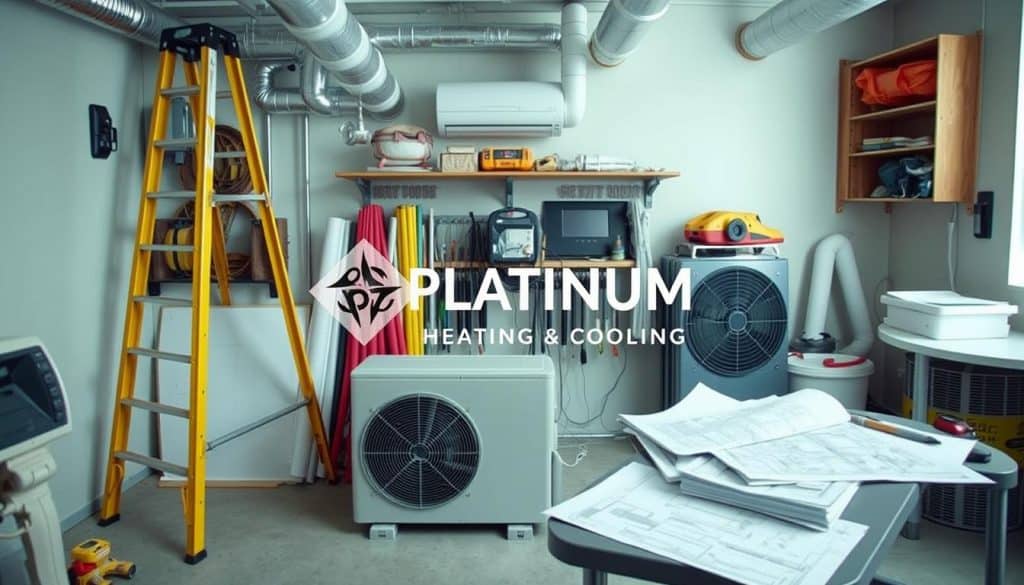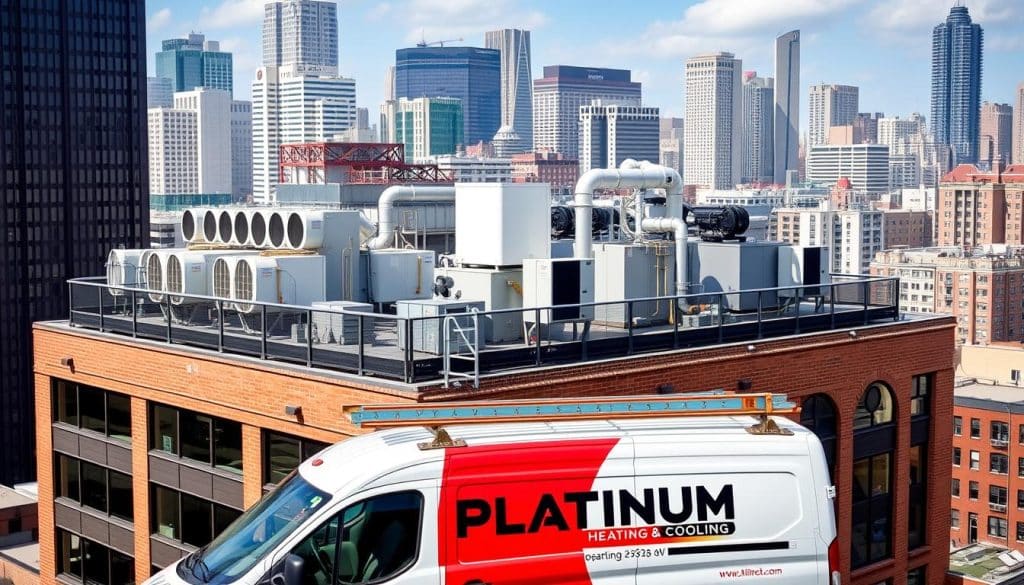Table of Contents
Ever wondered What Qualifications Should a Commercial HVAC Contractor Have? When looking for a reliable contractor for your commercial property, it’s key to check their qualifications. This ensures your heating and cooling systems run smoothly.
Experienced pros, like those at Platinum Heating & Cooling, tackle unique challenges with their specialized skills. They offer excellent services like AC repair & install, commercial HVAC for new buildings, and unit heater service & install. But what makes a commercial HVAC contractor truly qualified?
Key Takeaways
- The qualifications for commercial HVAC contractors significantly impact the performance and longevity of HVAC systems.
- State-specific HVAC licensing ensures contractors meet local standards and regulations.
- Essential certifications demonstrate a contractor’s expertise and commitment to ongoing education.
- Platinum Heating & Cooling is an example of a trusted contractor providing specialized HVAC services.
- Experience in the commercial sector is crucial for handling complex HVAC projects efficiently.
Importance of Proper Licensing and Certifications
Getting the right HVAC licensing and commercial HVAC certifications is key. It shows you’re a pro in the field. Companies like Platinum Heating & Cooling follow state rules to get licensed. They make sure they have the needed experience.
State-specific HVAC Licensing Requirements
HVAC licensing rules change from state to state. They often include exams, school courses, and apprenticeships. For example, Texas needs Class A and Class B licenses with certain insurance levels.
In Florida, there’s a big difference between Certified and Registered Air Conditioning Contractors. These rules cover background checks, financial checks, and experience needs. They make sure services are top-notch everywhere.
Essential Certifications
Having the right commercial HVAC certifications is also vital. The EPA Section 608 Technician Certification is a must for working with refrigerants. NATE certification shows a technician’s top skills.
These certifications prove a contractor’s skills and commitment to quality. They also show they follow environmental and safety rules. Meeting these standards shows a contractor’s hard work and dedication to HVAC excellence.
Relevant Experience in the Commercial Sector
When looking for an HVAC contractor, their experience in the commercial sector matters a lot. A good contractor should show a wide range of projects they’ve done well. This proves they can handle different tasks and do them right.
Types of Projects Handled
The types of HVAC projects a contractor has done can tell you a lot. Platinum Heating & Cooling, for example, has worked on many different tasks. They’ve done everything from small installs to big commercial HVAC jobs.
Their work shows they can adapt to any project. They’re skilled at handling all sorts of HVAC needs.
Years of Experience
The years of service an HVAC contractor has is also key. A contractor with lots of commercial sector HVAC experience has faced many challenges. They’ve learned how to handle complex HVAC systems well.
Their long experience means they can meet specific commercial needs. They always aim for the best results in every project.
Insurance and Bonding Requirements for HVAC Contractors
Insurance and bonding are key for both contractors and clients. They show a contractor’s professionalism and reliability. In the HVAC field, they protect against risks.
General Liability Insurance
General liability insurance is vital for HVAC contractors. It covers damage to property, injuries, and other issues. For example, Platinum Heating & Cooling has this insurance to avoid financial loss.
Workers’ Compensation Insurance
Workers’ compensation insurance is also crucial. It pays for medical bills and lost wages if an employee gets hurt. It’s not just a legal must but shows a contractor cares about their team.
Surety Bond or Performance Bond
Surety or performance bonds are also key. They ensure a project is finished and protect clients from contractor failure. In Alabama, HVAC contractors need a $15,000 bond. These bonds give clients confidence in contractors like Platinum Heating & Cooling.
Customer Reviews and Reputation
Creating a strong professional HVAC contractor reputation is more than just knowing how to fix things. It’s about how well you treat your customers. Positive customer reviews show a contractor’s promise to do great work and serve well. Platinum Heating & Cooling knows this, as reviews show their commitment to being the best.
Looking at reviews on Google and the Better Business Bureau can tell you a lot. Good feedback means the contractor is reliable and does quality work. A contractor with a good reputation usually has many positive reviews.
Warranty offerings also matter a lot. They show the contractor believes in their work and wants customers to be happy. For example, a good warranty program shows the contractor’s long-term commitment to their clients.
When choosing a contractor, think about the service quality and how they treat customers. Reviews and warranties give a full picture of a contractor’s trustworthiness and skill in HVAC.
Conclusion
The skills of a commercial HVAC contractor are key to keeping commercial spaces cool and comfortable. They need the right licenses, certifications, and lots of experience. Also, they must have good insurance and bonds to protect everyone involved.
Choosing a top-notch contractor like Platinum Heating & Cooling can really help your HVAC systems work better and last longer. They are known for their quality and care for customers. Their focus on being the best in their field shows in their work.
If you need reliable HVAC services for your business, knowing what to look for is important. To talk more or set up a meeting, call Platinum Heating & Cooling at (616) 229-0444 or email them at office@platinumheatingmi.com. Picking a contractor who meets these standards will give you the best climate control for your business.



